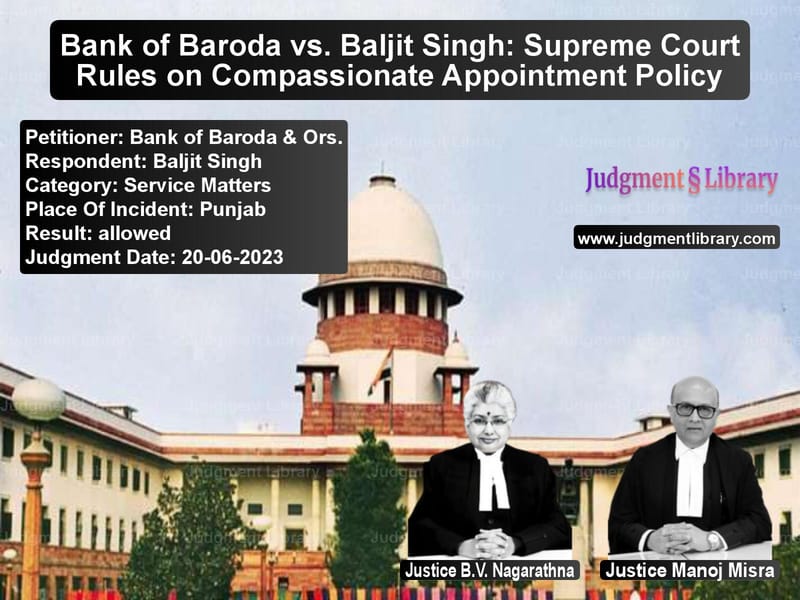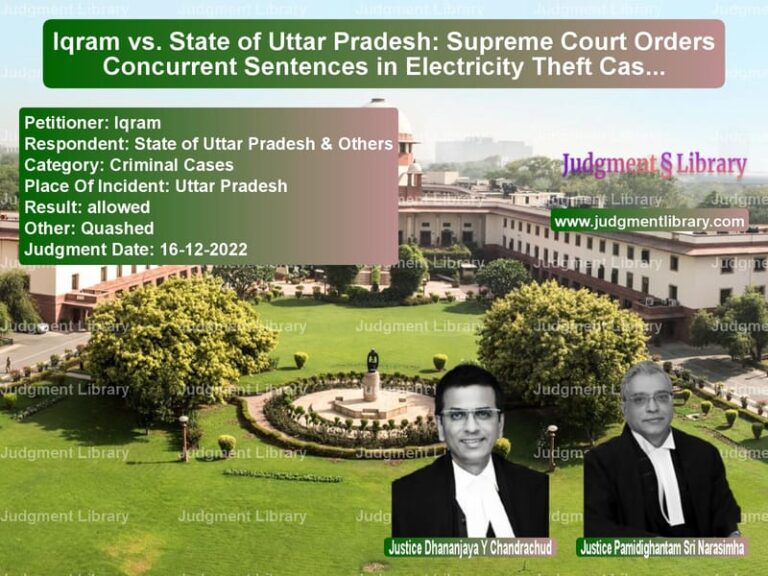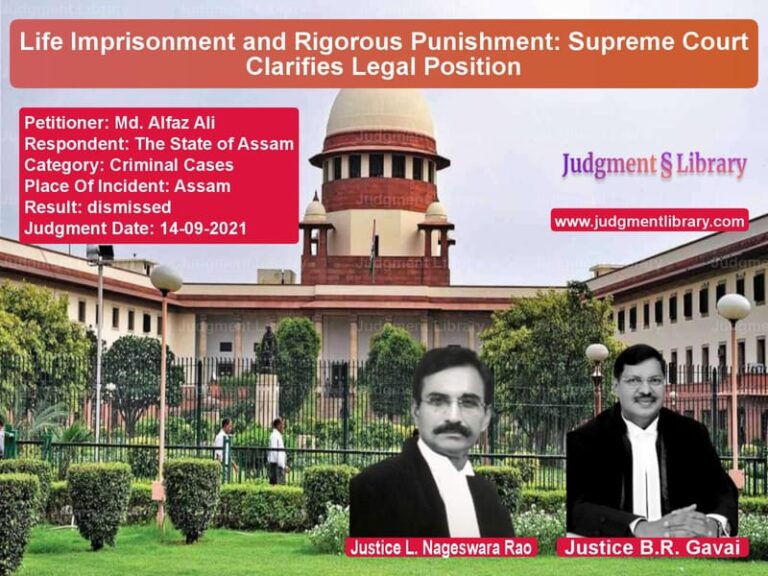Bank of Baroda vs. Baljit Singh: Supreme Court Rules on Compassionate Appointment Policy
The case of Bank of Baroda & Ors. vs. Baljit Singh revolves around the issue of compassionate appointment in public sector banks. The Supreme Court, in its judgment dated June 21, 2023, set aside the High Court of Punjab and Haryana’s ruling, which had directed Bank of Baroda to consider the respondent’s appointment on compassionate grounds. The Court reaffirmed that compassionate appointment is an exception to the general rule of public employment and must strictly adhere to the policy in force at the relevant time.
The dispute arose when Baljit Singh, son of a deceased bank employee, sought employment under the Bank’s compassionate appointment scheme. His request was rejected on the grounds that he did not meet the financial eligibility criteria stipulated in the scheme. However, the Punjab and Haryana High Court ruled in his favor, directing the bank to appoint him. The bank challenged this decision before the Supreme Court.
Background of the Case
Baljit Singh’s father, an employee of Bank of Baroda, passed away on May 16, 1999. At that time, the bank had a compassionate appointment scheme issued through a circular dated August 18, 1998. Under this scheme:
- The family of a deceased employee could apply for compassionate appointment if they were in financial distress.
- Eligibility was determined by assessing the family’s financial condition, including income from various sources.
Baljit Singh’s mother applied for his appointment as a Peon in 2000. However, by the time his application was considered, the bank introduced a new scheme on March 10, 2004. Under this scheme, applicants had to demonstrate that their family’s financial condition met the eligibility criteria. The bank assessed his family’s income and rejected the application on June 8, 2004, citing financial ineligibility.
Aggrieved, Baljit Singh filed a civil suit seeking a declaration and mandatory injunction against the bank. The trial court ruled in his favor, directing the bank to consider his appointment. The first appellate court overturned this decision, but the Punjab and Haryana High Court reinstated the trial court’s judgment. The bank then appealed to the Supreme Court.
Key Legal Issues
- Whether compassionate appointment is a vested right of the deceased employee’s family.
- Whether the financial condition of the applicant’s family should be considered as per the scheme in effect at the time of application or at the time of decision-making.
- Whether the High Court erred in interfering with the bank’s decision.
Supreme Court’s Analysis and Judgment
1. No Vested Right to Compassionate Appointment
The Supreme Court reiterated that compassionate appointment is not a vested right but an exception to the general rule of public employment. The Court observed:
“Compassionate appointment is meant to provide immediate relief to a bereaved family in financial distress. It is not a matter of inheritance or an alternative to regular recruitment.”
The Court emphasized that such appointments must be strictly governed by the scheme in force at the time the decision is made, not at the time of the employee’s death.
2. Financial Eligibility as per the Scheme in Force
The respondent argued that his application should be considered under the 1998 scheme, which was in force when his father died. The Supreme Court rejected this argument, ruling:
“The financial eligibility of an applicant must be determined based on the scheme in force when the application is considered, not when the employee passed away.”
The Court found that under the 2004 scheme, Baljit Singh’s family income exceeded the threshold for financial distress. Hence, he was ineligible for compassionate appointment.
3. High Court’s Error in Overruling the Bank’s Decision
The Supreme Court held that the High Court exceeded its jurisdiction by interfering with the bank’s policy-based decision. It observed:
“The courts cannot substitute their own judgment for that of the employer when the employer’s decision is based on a reasonable interpretation of its policy.”
The Court cited precedents emphasizing that judicial interference in policy matters, particularly in public employment, must be minimal.
Final Ruling
- The Supreme Court set aside the High Court’s judgment and reinstated the decision of the first appellate court, which had ruled against Baljit Singh.
- It held that the rejection of the respondent’s application was justified under the 2004 scheme.
- The Court reaffirmed that compassionate appointment is an exception and must be strictly governed by prevailing policy.
Implications of the Judgment
This ruling has significant implications for public sector employment policies:
- It reinforces that compassionate appointment is a concession, not a right.
- It clarifies that eligibility must be assessed under the scheme in force at the time of decision-making.
- It limits judicial interference in employer decisions based on policy.
- It underscores the importance of financial eligibility criteria in compassionate appointment cases.
Conclusion
The Supreme Court’s decision in Bank of Baroda vs. Baljit Singh reaffirms the principle that compassionate appointment must be governed by the policy in force at the time of decision-making. It protects the integrity of public sector employment policies while ensuring that compassionate appointments remain an exception rather than a rule. This judgment provides clarity on the legal framework governing such appointments and reinforces the employer’s discretion in implementing its policies.
Petitioner Name: Bank of Baroda & Ors..Respondent Name: Baljit Singh.Judgment By: Justice B.V. Nagarathna, Justice Manoj Misra.Place Of Incident: Punjab.Judgment Date: 20-06-2023.
Don’t miss out on the full details! Download the complete judgment in PDF format below and gain valuable insights instantly!
Download Judgment: bank-of-baroda-&-ors-vs-baljit-singh-supreme-court-of-india-judgment-dated-20-06-2023.pdf
Directly Download Judgment: Directly download this Judgment
See all petitions in Employment Disputes
See all petitions in Recruitment Policies
See all petitions in Judgment by B.V. Nagarathna
See all petitions in Judgment by Manoj Misra
See all petitions in allowed
See all petitions in supreme court of India judgments June 2023
See all petitions in 2023 judgments
See all posts in Service Matters Category
See all allowed petitions in Service Matters Category
See all Dismissed petitions in Service Matters Category
See all partially allowed petitions in Service Matters Category







